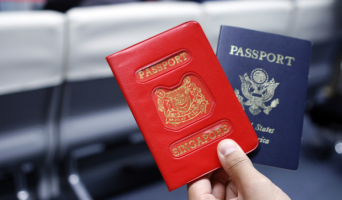5 things on your to-do list when your child goes abroad to study
The time has come for you to send your children off for their student exchange programme.
You bid them farewell at the airport, turn around, and realise, you haven't prepared them for their time abroad and it's too late now. You didn't even remember to buy an insurance plan for them.
Don't let this happen to you!
Overseas study trips can be daunting for your children, even if they are unwilling to admit it. As the voice of wisdom in their lives, nagging and preparing them against their wishes are the best things you can do for them. And so, here are 5 important things for you to do before your child goes abroad to study:
1. Read up on the host country
 Photo by Simon Migaj via Unsplash
Photo by Simon Migaj via Unsplash
Familiarising yourself with the laws, customs and embassy locations of the host country will certainly give you more peace of mind. The latter can provide your child with advice and assistance should they face problems with their visa or passport.
Will there be important local holidays when your child is in the country? Maybe they can bask in the festivities. What will the weather be like when they're there? This helps them know what kinds of clothes to bring along. Look for tips and advice and gather as much information as possible about the school your child will be attached to. This will help both yourself and your child to better prepare for the trip.
2. Set up an overseas bank account
In order to ensure online money transfers are safe and secure, it may be wise to set up an overseas bank account when your child goes on a student exchange programme.
In the event that you need to transfer money to them, online bank transfers are the most efficient way. Having an overseas account allows them to deposit their money in a place without having to carry cash around with them. They can better keep track of their spending in this way. Since they are going overseas for an extended period, this may be a wise move.
Do note that some bank transfers may be subject to additional fees and rates for transfers to and from a foreign account, so remember to read the fine print!
3. Create a list of emergency contacts
 Photo by Priscilla Du Preez via Unsplash
Photo by Priscilla Du Preez via Unsplash
While student exchange programmes are a great time for your child to be independent, having a list of emergency contacts for both you and them is almost certainly a must.
If they are travelling with schoolmates, be sure to get their contact details so you will have contact points in the event of an emergency. You can also compile a list of important contacts such as your child's local university office and your insurance agent for your child so that they are not left helpless if a situation arises.
Many children also make it a point to have video calls with their parents when on an exchange trip. For such purposes, Skype is a good bet. Decide when and how often you are going to have such calls and check on your child from time to time to find out how they are doing. This emotional connection is something that every child will need - even the ones who claim that they are independent!
They may shrug their shoulders now and claim that they won't miss you, but give them a week or two overseas and they'll be homesick for sure.
4. Source for good accommodation
Accommodation is often a headache when travelling, much less during an extended stay that might last for up to 6 months!
However, many overseas partner Universities have accommodation options on campus, and countries such as Germany have portals dedicated to helping exchange students source for places to stay in.
Financial concerns, safety and security, proximity to the University campus - these are just some of the important things to consider to determine what is a "good" accommodation. If possible, get your child to ask for advice from seniors who have gone on exchange programmes before them.
5. Get a suitable insurance plan for your child
 Photo by Holly Mandarich via Unsplash
Photo by Holly Mandarich via Unsplash
Making sure their child is safe abroad is certainly the biggest concern for a parent. When deciding on an insurance plan for them, you should consider their needs - are they the adventurous type? Knowing what the insurance plan covers is important as well. Some may not cover against travel inconveniences that happen in neighbouring cities or countries. Others may exclude hospital and surgical expenses incurred, even if they were during the travel period.
For an insurance plan that has been tailored to the needs of students on exchange programmes, the Overseas Study Protection Plan (OSPP) has, literally, got you covered.
On top of covering routine areas such as accidents and loss of personal items, the OSPP also covers oft-ignored inconveniences such as study interruptions and criminal assault.
It also offers coverage for 1 year as compared to travel insurance plans that only last for 180 days.
Hospital expenses and outpatient treatment of sickness are included as well. Being in a foreign country may often yield sicknesses, so coverage like this certainly helps.
With comprehensive coverage at an affordable price, the OSPP is there to protect your child from hefty hospital charges and pesky personal belonging losses.
Find out more here! Student exchange programmes are often a cause for concern for parents, but they don't have to be with a good protection plan that's got your child covered.




